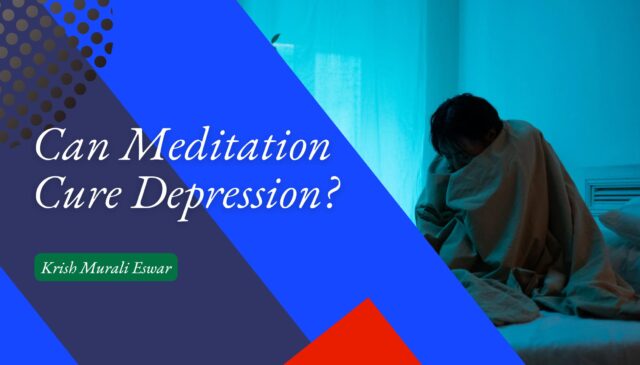
As a meditator for 39 years, I can confidently say that meditation has been an invaluable tool in helping me cope with depression. It’s like having a trusted friend who is always there to listen and provide support.
Meditation has helped me to gain clarity and perspective on my thoughts and feelings, allowing me to make better decisions and take positive action. While it may not be a cure-all for clinical depression, I believe it can be an essential part of the healing process. If you are struggling with depression, I highly recommend seeking professional help from a doctor or therapist.

What is Depression?
Depression is a mental health disorder characterized by persistent sadness, hopelessness, and worthlessness.
“Depression is like being stuck in a dark tunnel with no end in sight.” – Dr. Aaron T
It can be debilitating and interfere with daily life, making it difficult to function. An analogy for depression might be being lost at sea without a compass – you don’t know which way to turn or how to get back on track.
How does the brain react to depression?
Depression is a complex mental health disorder affecting our thoughts, feelings, and behavior.
It can cause us to become overwhelmed with negative thoughts and feelings of hopelessness, worthlessness, and sadness.
The brain reacts to depression in several ways.
- Neurotransmitters like serotonin and dopamine are released in lower amounts when we are depressed, leading to feelings of fatigue and apathy.
- The hippocampus (the part of the brain responsible for memory) shrinks in size when we experience depression, making it difficult to recall positive memories or experiences.
- Our prefrontal cortex (the area responsible for decision-making) becomes less active when we are depressed, making it harder to make decisions or take action.
Cortisol, Amygdala, and Depression Link
The link between depression and cortisol is a strong one. Cortisol is a hormone released in response to stress, and when levels of cortisol are too high, it can lead to feelings of depression. The amygdala, an almond-shaped structure in the brain, plays a vital role in this process.
Amygdala is responsible for processing emotions like fear and anxiety, which elevated cortisol levels can trigger.
“Conscious experiences, including experiences of fear and anxiety, are colored by memory.” – Dr. Joseph LeDoux
The amygdala can be thought of as the gatekeeper that keeps us from finding our way out.

7 Major Symptoms of Depression
- Persistent feelings of sadness and hopelessness
- Loss of interest in activities that were once enjoyable
- Difficulty concentrating or making decisions
- Changes in appetite or weight
- Insomnia or excessive sleeping
- Fatigue and low energy levels
- Thoughts of death or suicide

Can Meditation Cure Depression?
While meditation alone cannot cure clinical depression, it can be an essential part of the healing process. By helping us gain clarity and perspective on our thoughts and feelings, meditation can help us make better decisions and take positive action.
Research has shown that regular meditation can reduce symptoms of depression by increasing levels of serotonin in the brain and reducing stress hormones such as cortisol. Therefore, while it may not be a cure-all for depression, incorporating meditation into your daily routine can be a powerful tool for managing depression and improving overall mental health.
So if you’re feeling down in the dumps, don’t despair – meditation may be your ticket to brighter days!
“The only way out of the darkness is to find the light within ourselves.” – Emil Kraepelin
How long does it take for meditation to help depression?
With regular practice, meditation can help reduce symptoms of depression within a few weeks.
According to the research by Khoury, Lecomte, Fortin, Masse, Therien, Bouchard, and Hofmann (2013), mindfulness-based therapy can effectively manage depression. Their meta-analysis found that just four weeks of meditation can reduce symptoms of depression by increasing levels of serotonin in the brain and decreasing stress hormones such as cortisol. This suggests that while it may not be a cure-all for depression, incorporating meditation into one’s daily routine can help to improve overall mental health.
Depression can be like a journey through a dark tunnel with no end. The walls are cold and damp, and the air is heavy with despair. But meditation can be a beacon of light in this darkness, guiding us out of the depths of depression and into a brighter future.
With regular practice, meditation can help us slowly break down the walls of our mental prison, allowing us to find freedom from our negative thoughts and feelings. It may take time for these changes to take effect, but with patience and dedication, we can eventually find ourselves standing in the sunshine again.

What kind of meditation is best for depression?
Kundalini meditation is one of the most effective forms of managing depression. This meditation focuses on connecting with the energy within us and using it to bring about positive change. It can be combined with introspection exercises to help us gain insight into our thoughts and feelings, allowing us to understand our emotions better and take action accordingly.
Can meditation replace antidepressants?
No, meditation cannot replace antidepressants. While meditation can be a powerful tool for managing depression, it is not a substitute for medical treatment. Antidepressants are designed to target specific chemical imbalances in the brain that can cause depression, and they should always be taken under the supervision of a doctor.
Meditation can help us gain clarity and perspective on our thoughts and feelings, but it cannot directly address the underlying causes of depression. It is like shining a flashlight into a dark room – while it may illuminate some of the shadows, it cannot make them disappear completely.
Similarly, meditation can help us gain insight into our emotions and take positive action, but it cannot replace the targeted effects of antidepressants. Just as we need to use light and heat to warm up a cold room, we must combine medication with meditation to manage depression effectively.
WARNING: Consult a Doctor First Before Trying Meditation
It is essential to consult a doctor before attempting to use meditation as a treatment for depression. While meditation can be beneficial in managing mild depression, it can worsen the symptoms of clinical depression.
This is because people with clinical depression often have difficulty regulating their emotions and may become overwhelmed by intense feelings that arise during meditation. Additionally, they may become discouraged if they cannot achieve the desired results from their practice.
Therefore, those with clinical depression need to seek professional help and work with a qualified therapist or psychiatrist who can provide them with the appropriate treatment plan.

Can meditation cure overthinking
Meditation can be a powerful tool for managing to overthink. By focusing on the present moment and connecting with our inner self, we can learn to observe our thoughts without getting caught up in them. This helps us to gain clarity and perspective on our mental chatter, allowing us to make better decisions and take more positive action.
Using kinesthetic imagery during meditation can help us further break down the walls of our mental prison. We can imagine ourselves standing in a room filled with all our negative thoughts and feelings, then slowly starting to dismantle the walls brick by brick until they are gone. As we do this, we can feel the weight of these worries being lifted off us, allowing us to find freedom from overthinking.
We can also use kinesthetic imagery to create a safe space where we can go whenever we need a break from our racing thoughts. This could be an imaginary beach or forest – whatever works best for you – where you can relax and be in the moment without worrying about anything else.
We can gradually learn to manage our overthinking and find peace by using meditation and kinesthetic imagery.
Conclusion
In conclusion, meditation can be a powerful tool for managing depression. It can help us gain clarity and perspective on our thoughts and feelings, allowing us to take positive action and find peace within ourselves.
“The journey of a thousand miles begins with one step” –Ancient philosopher Lao Tzu.
If you found this article helpful, please leave a comment on my blog and subscribe to stay updated on new posts.
Together we can create a brighter future for those struggling with depression.
Be Blessed by the Divine!
Krish Murali Eswar.
Leave a Reply